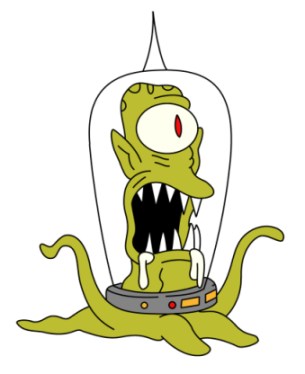
Is Allah God? Are Christians and Muslims talking about (numerically) the same God? We’ve previously linked and joined in with discussions with Jeremy Pierce and with Kevin Corcoran.
To further the discussion, I present a tale to explain why it may matter less than you think whether or not the words”God” (used by Christians) and “Allah” (used by Muslims) refer to the same being.
A kind and generous woman named Sophie decides to sponsor two children through World Vision. She offers to give to children from “wherever the need is greatest”, and weeks later, a letter reveals that she is the new sponsor of two brothers from some third-world country she’s never heard of. Their names are Goofus and Gallant, and they are identical twins.
Each month, Sophie sends off a generous check, along with a note. She’s not sure about the boys’ religious affiliation, so she sticks with good general advice, which she hopes will apply no matter what. “Treat others as you want them to treat you.” “Forgive others, just as you are forgiven.” “Love and serve the Creator.” “Love one another.”
She also sends kind little notes every so often. “I love you.” “You’re growing to be so big!” “Hope to meet you some day.”
Sophie doesn’t know this, but Goofus and Gallant are rather confused about their benefactor. They (correctly) believe that their benefactor is a rich, English-speaking being who lives far away, but some silly playground talk, the occasional television show, and some translation problems leads them to believe the following things about their benefactor – about the source of their support and the occasional notes and letters:
1. He is a space alien with green tentacles, who must wear a bulbous glass helmet when visiting the earth.
2. Once, probably, he killed a kitten. Or something like that.
3. He and his planet mates once invaded the Earth, but were repelled by a bartender wielding a board with a nail in it.
4. He’s a shape-shifter. In addition to his usual form, he could appear, say, as a middle-aged caucasian American woman.
Goofus and Gallant often discuss their benefactor, whom they refer to (no one knows why) as “Grok”. They have very different attitudes about Grok. Gallant loves Grok and is grateful to him. He hopes that some day he can somehow return Grok’s love, and eagerly desires to meet him. Every week he writes Grok a letter, telling Grok about his day, and writing out his hopes, dreams, and fears. He has a large stash of these, saved for a hoped-for future delivery to Grok.
Goofus hates Grok. His dark imagination conjures up some evil motives which he attributes to Grok (something about WalMart, global hegemony, and soylent green), and each of “Grok’s” (in fact, Sophie’s) letters to Goofus are greeted with (1) spit, (2) toilet paper usage, and (3) burning (of course, always in that order). Goofus ignores the copious benefits flowing from “Grok”, ignores or maliciously reinterprets the monthly notes, and in fact hates Grok so much that he will try to kill anyone who so much as says a good word about Grok.
Ten years pass this way, and Goofus and Gallant are now graduating from high school. Sophie decides that she’ll surprise “her boys” by attending their graduation. She buys a ticket to their country, and boards the plane with presents, a loving heart, and ten year’s worth of longing.
When she arrives, will she care whether or not “Grok” (spoken by Goofus and Gallant) refers to her? No.
- If “Grok” fails to refer to her, she’ll accept Gallant’s letters as if they were written to her. This country is very backwards, so she doesn’t blame Gallant for his mistaken beliefs about the imaginary “Grok”. She’ll treat Gallant as if he’d loved her, and not the imaginary “Grok”.
- If the word “Grok” has all along referred to her, she’ll accept Gallant just the same.
- Either way, she’ll find Goofus unacceptable. Has he hated merely an imaginary character? If so, still, he’s made himself the sort of person who would hate Sophie if informed that she were in fact his World Vision sponsor. Or was Gallant’s hate in fact directed at Sophie all along? (i.e. when Goofus thought and spoke about “Grok”, he thereby referred to Sophie) She will not force her love on him, and so will pass him by.
Sophie has generously dished out benefits for ten years; she’s fishing for someone who will return her love. Because she’s looking for the right sort of person, it is inconsequential to her whether or not someone has actually successfully referred to her, or recognized her as the source of blessings.

What an utterly silly post. As if the moral obligations to God and the relationship with God outlined in the Bible can be reduced to receiving a check every month. This analogy is bogus. It simply doesn’t translate to the Bible.
It’s also crassly pragmatic, like saying there’s no difference between a book of Shakespeare plays or a stack of Playboy magazines, if you’re only interested in propping up a table leg.
Pingback: trinities - trinities turns 5 (Dale)
Hi Jerry,
I agree there’s only one true God, and that Christianity has the uniquely best understanding of him. Note that both Goofus and Gallant in my story are sincere; so the moral isn’t that sincerity guarantees acceptance with God.
It certainly does matter whether one prays to and worships the Christian God or the Muslim god allah. There is only one true God and He can only be reached through His Son Jesus Christ. A person can be as sincere as they want and go to hell. How about old testament or modern day peoples who pray to outright false gods. Does the real God honor them because they are sincere?
Comments are closed.